Cyprus
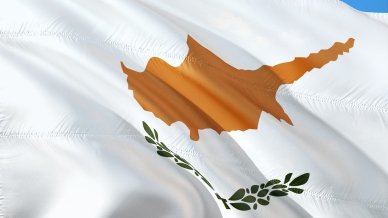
Cyprus is a favourite holiday destination for Europeans who aspire to relaxation lost within the unrelenting pressures of modern life. Those who got burned out by everyday worries will find everything they need: quiet, tender sea, the sun shining bright, clean beach sand, select fruit and vegetables, and much high-quality and tasty food.
You may feel the Mediterranean waves yearning to relax, the white sands compelling to forget the fuss and enjoy the sea waters, and the cafes and restaurants inviting to taste the delicacies.
That is Cyprus. Here, things are so different that even time flows at a slow and lazy pace.
“Siga siga” (“slowly slowly”) is the most popular and widely used phrase in the country where nobody is in a hurry.
The expression depicts Cyprus as it is, its image, and velocity of life. This southern nation is warm-hearted, splattering with sun and joy, and sometimes lazy. Their mentality, habits, and life philosophy may surprise and irritate but will never leave anyone indifferent.

General Information
According to the geography textbooks, Cyprus is a Mediterranean island country. However, this unshakeable truth has some ins and outs. Though the island belongs to Europe, it is located in the Middle East region, the centre of which is in Western Asia and Egypt.
In 1975, the island was divided between the Republic of Cyprus (57.6%) and the Turkish Republic of Northern Cyprus (36%). The rest almost evenly came under the control of the UN and the British Army.
Historical Background
A convenient geographical location of Cyprus used to sparkle the invasions of such mighty states as Greece, Rome, the Byzantine, and the Ottoman Empire.
At first, the island was settled by the battailous ancient Greek tribes of Achaeans that were coming back from the war with Troy at that moment. They saw no man’s land, landed there, and began laying down their laws.
As time progressed, many Greeks settled there and successfully assimilated. Local people gradually forgot their languages and started speaking Greek. That was how Cyprus became de facto a Greek island. Even now, the ancestors of ancient Hellenes live there.
Later, it was a part of many states that annexed it due to its advantageous location. Cyprus used to be a province of the Ptolemaic Kingdom, the Roman and Byzantine Empires.
Cyprus used to be a military trophy, an item of sales and purchase, and even a gift. Being conquered by Richard the Lionheart, the island changed hands several times. It was in possession of the notable French dynasty of Lusignans, who founded the first and only kingdom on Cyprus, which existed for 300 years.
Then the Queen of Cyprus, a Venetian by origin, presented the island to the Republic of Venice as a gift.
In the 16th century, when the Ottomans brought almost the entire southeastern Europe, a part of Asia and Africa under their control, Cyprus could not but become a Turkish province, which belonged to the Empire for more than 300 years.
At the end of the 19th century, the island came into British possession again till the 1960s.
Cyprus gained independence in 1960 after the decades of the national liberation movement.

Declaration of Independence of Cyprus, 16th August 1960
However, the peaceful life of a newly formed republic was nondurable. The reason was the long-standing conflict of the Greek and Turkish communities in the religious background. Thus, peacekeeping forces entered the capital city Nicosia in 1964.
The internal conflict of the communities resulted in a real war between Greece and Turkey. The Turks managed to occupy a considerable part of the island and thus establish the Turkish Republic of Northern Cyprus in 1978.

The invasion of Cyprus in 1974 by Turkey
Nicosia suffered the same destiny as Berlin did after World War II. And now it is the only capital in the world divided between two countries. Its northern part belongs to the Turks and is called Lefkoşa. The Republic of Cyprus possesses the rest of its territory under the name of Lefkosía. The border between both parts lies across Ledra, the main shopping street in Nicosia. That is the UN Buffer Zone in Cyprus patrolled by the UN peacekeeping forces.
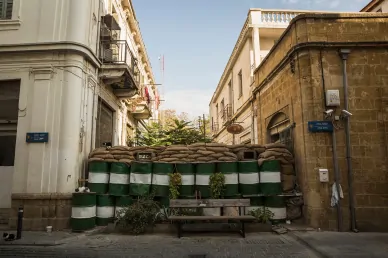
A street barricaded with oil drums and sandbags in Nicosia on the south side of the UN buffer zone.
There are also Greek and Turkish checkpoints and their own Berlin wall that divides the two countries. There began the deconstruction of the Greek part of the wall while the Turkish part has remained untouched.
Climate and Geography
Officially, Cyprus possesses not only the island of the same name but also seven small islands around. Their territory is mainly mountainous. The rocks stretch even along the coast, though its major part contains marvellous sandy beaches.
Climate is sub-tropical of Mediterranean type, which means dry and hot summer with an average temperature of +30°C and mild winter with much precipitation, mainly rains.
The high season begins in April and ends in October. January is considered the coldest month when the temperature hardly reaches +15°C during the day and drops to +5°C at night. Nonetheless, the sea remains warm enough: the water temperature remains +16°C and thus lures the most desperate tourists who are keen on swimming despite any weather.
When water and air get warmed enough (+20°C) in April, the season opens. It reaches the peak in July and August with the average air temperatures of +35°C - +40°C and +25°C - 27°C of water.
September and October constitute the off-peak season in Cyprus. Mild warmth of +24°C - +27°C replaces the scorching day heat, and the sea retains the August temperatures. Only in October, it becomes colder — +23°C - +24°C. The days become much shorter, and the first rains begin.
Language, Population, and Currency
The territory of Cyprus is very extensive. However, it is an underpopulated island because only around 1.25 million people live there.
More than 50% of the population is Greeks who speak Cypriot Greek and adhere to Orthodox Christianity.
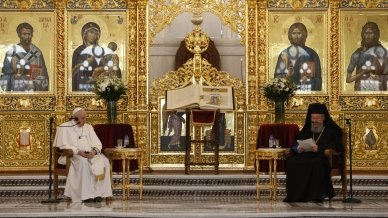
Pope Francis and Orthodox Archbishop Chrysostomos II of Cyprus at the Orthodox Cathedral in Nicosia, Cyprus, Dec. 3, 2021.
The ethnic Turks live in the Turkish part of Cyprus, profess Islam, and speak Turkish. In this way, there are two official languages in use.
In 2004, the republic joined the EU. The official currency is the euro.
EU citizens do not need a visa to enter Cyprus, they should have a valid passport or national identity card. The Ministry of Foreign Affairs website provides a list of countries and categories of persons that do not need a visa to enter the Republic of Cyprus. However, citizens of some countries are required to have a biometric passport to enter the state without a visa.
The other categories of travellers may apply for a short-stay/multiple-entry visa or airport transit visa.
The other options and requirements are available on the Ministry of Foreign Affairs website.
Directions
Getting to Cyprus is possible by plane. However, take into account that there are no flights to the capital city Nikosia: there is no international airport. The last one existed till 1974 when the war with Turkey began. At present, its territory is occupied by the military base of the UN troops.
The most popular directions are Larnaca and Paphos, the International Airports of which service many regular and charter flights.
Experienced travellers try to plan their vacation in Cyprus and book tickets at least three months in advance. That is a perfect opportunity to save money because, as it is known, the closer the flight date, the higher the cost of the tickets.

Accommodation
The tourism industry is the main direction filling the country’s budget. Thus, the skills of welcoming the guests have been honed to the level of mastery. And tourists will get a positive response to any request, be it an ordinary hostel or a luxurious penthouse in a five-star hotel.
The prices depend on the season. They are higher between May and October than in winter, spring, or late autumn, but in general, do not differ much from the ones in Turkey (€30 - €50):
- Onisillos Hotel is a two-star hotel in Larnaca, located near the sea, a 5-minute walk from the beach. The rooms are cosy, equipped with air-conditioning, refrigerators, and kitchenettes. Free Wi-Fi.
- Rio Napa Apartments is a two-star hotel in Ayia Napa and one of the noisiest youth resorts. All rooms are equipped with air-conditioning, Wi-Fi, and TV sets. Though plain, the rooms are clean and comfy. The other amenities also include a swimming pool and a transfer to the airport.
- Christys Palace Hotel is a nice hotel in Nikosia with a car park, free breakfast, and Wi-Fi. There is a balcony, a bathroom, a shower, a fridge, and a coffee machine in each room.
- Panklitos Apartments is a two-star hotel in Paphos. The rooms are furnished in an ordinary but very comfortable way. There is a swimming pool and free Wi-Fi on the premises. A kitchenette, air-conditioning, and a fridge are provided in each room as well.
- Lemongrass Hostel is a nicely designed cheap but comfortable hostel in Limassol with separate and shared rooms. Toilet and showers are shared too. Free Wi-Fi.
The rented suites are a different matter. There are many ins and outs in renting accommodation in Cyprus, and the main thing is that Cypriots are not in favour of short terms. In other words, if you have planned a one- or two-week vacation, it is pointless to search for a suitable apartment because nobody is going to let it to you.
Any term no longer than one year is considered short, particularly by the real estate agencies. They are reluctant in considering the requests from the tourists who expect to live in the country for one or even three months.
The shorter the term of the lease, the more money you will need to pay for it. The daily rent is particularly costly, so it is better to opt for a hotel straightaway. For example, an excellent suite will cost approximately €300 - €500 a month for a year-long period. But if you choose to rent an apartment on a daily basis, the price will be at least twice higher.
Nonetheless, the tourists have come up with a lifehack that enables them to find an excellent option and save some money.
They sign a one-year lease agreement with the corresponding payment (the longer the period, the cheaper a month during this period will cost) that includes the installment and the money for the last month. In three months, when the high season ends, tourists move out, thus breaching the lease. In this way, the sum for the last month is a fine paid for breach of the contract.
But eventually, the tenant ends up getting the benefit. The sum that includes the fine paid is much smaller than the one that a tenant would pay in the event of renting accommodation during the peak of the season.
Accommodation in Cyprus is of high quality. The apartments are equipped with the necessary home appliances, well-furnished, and clean. Besides, one bedroom does not necessarily mean a cramped space. It is about an apartment with a living room, a balcony, and of course a bedroom.
Also, keep in mind that renting an apartment in Cyprus online is impossible because local estate agencies prefer working with their clients offline. So it will be necessary to visit their offices upon arrival.
Places to See
The island, steeped in legends, lures travellers with its sightseeing attractions. People are striving not only for beach recreation, but they also want to delight in the views of antique settlements and the Middle Ages castles, get away from noisy resort hangouts in the turquoise quiet of national parks.
The people of faith go to Cyprus to worship the Christian relics, pray for the health of their family members, and bring the holy water home from the healing springs.
Aphrodite’s Rock and Baths
According to the ancient legends, Aphrodite was born in Cyprus from the sea foam brought by the wind to the island shores.
Cypriots are not the only ones who honour the memory of the goddess of love: thousands of loving couples from all over the world come every year. One of the most romantic attractions of Cyprus is Petra tou Romiou, known as Aphrodite’s Rock, on the way from Paphos to Limassol. Since ancient times, it has had the name of a rock, but in reality, it has nothing in common with the coastal mountains. At present, it is a big stack, located in the sea not far from the shore.
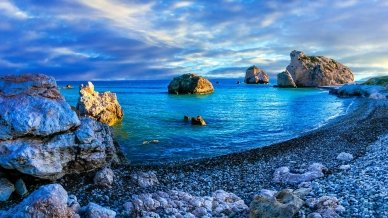
Petra tou Romiou (Aphrodite’s Rock)
There is a belief that if a person manages to swim and touch it, girls will remain eternally beautiful and get married soon, and men will gain courage, stamina, and love.
In addition to that, if one is lucky enough to have found a heart-shaped pebble, then a wedding or a passionate love affair is around the corner.
Aphrodite’s beach is a perfect venue to hold a wedding ceremony. Almost every day, local marriage agencies organise romantic events for the newlyweds and their guests.
The other popular attraction in Cyprus is the Baths of Aphrodite. This small grotto hidden in the shadows of thick greenery was a dating place of the young goddess and her beloved Adonis, the god of spring.
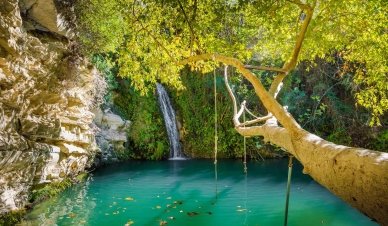
Baths of Aphrodite
You may start your tour there from Paphos: the baths are located a 50-km distance from the resort city on the Akamas Peninsula. Genuine admiration for the flamboyant nature, grueling rocks, and the peaceful noise of the waterfall will fill even the most hard-hearted individuals.
Despite the official ban to swim in the baths, some braves (predominantly, females) take the risk. As an ancient legend says, even immersion may help look younger.
Monasteries and Orthodox Shrines
At any time of the year, Cyprus is full of specific tourists not attracted by beach vacations. Those people come here to lower their heads towards miraculous icons and relics in 12 convents and friaries, run on the island.
The most visited are Stavrovouni and Kykkos. The first is also called the monastery of the Holy Cross because Stavro (Ancient Greek: Σταυρο) means cross.
Stavrovouni has existed since the 4th century AD and is considered one of the oldest monasteries in Cyprus. The main relic kept there is the cross of Penitent Thief, who was crucified together with Jesus, and a piece of the Holy Cross. It was Roman Empress Saint Helena who contributed it to the monastery.
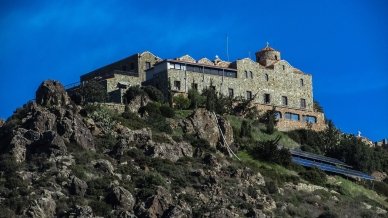
Stavrovouni monastery
Kykkos is a highland monastery built 1,000 m above sea level in the 9th century in the Troodos Mountains. Initially, there were only a couple of wooden constructions, but they burnt in the fire. New stone buildings appeared in the 16th century, but the belltower was built only 300 years later.
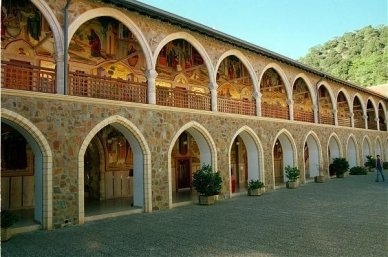
Kykkos monastery
Now Orthodox Christians are not afraid of getting to this highly located place. They arrive to pray to the miraculous icon of the Virgin Mary, which is believed to have been painted by Apostle Luke.
Kykkos is where the first President of Cyprus, Archbishop Makarios, began his path of serving God. His grave is located a 2-km distance from the monastery. Thousands of ancient manuscripts, items of ecclesiastic clothing, and accessories have been preserved near it as well as in the monastery museum and library. And, of course, many pilgrims visit the site.
Nicosia
Despite the complicated day-to-day realities, the capital of Cyprus annually attracts thousands of tourists. Almost everywhere, there are architectural masterpieces constructed centuries and even millennia ago.
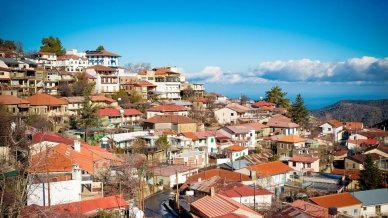
Nicosia, Cyprus
The historical part of Nicosia called the Old City is surrounded by the Middle Ages fortresses, built between the 16th and 17th centuries. Here you may see one of the most famous places in the capital of Cyprus called the Famagusta Gate, located in the Turkish part of the city.
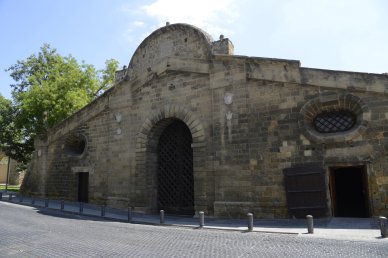
Famagusta Gate, Nicosia
Nobody knows precisely why the construction has this name. Famagusta is a ghost town with a tragic history, located in the east of the country.
The Gate evokes interest with its incredible acoustics of the internal 35-m tunnel, the annual venue to hold concerts. Astride it, there are two halls with a capacity of 200 people each, where permanent and temporary exhibitions, chamber concerts, lectures, and scientific conferences take place.
Several museums welcome visitors to immerse themselves in the history of Nikosia. The most compelling exhibitions are displayed in 14 halls of the Archaeological Museum, Byzantine Museum, and the Gallery of Arts, located in the Archbishop’s Palace.
Kourion
The ruins of the ancient city-state not far from Limassol are another monument of antiquity. And those keen on archaeology necessarily aspire to see those marvels.
Once, Kourion (also called Curium) appeared on the 70-m cliff as a state built by Greeks after the Trojan War.
The advantageous location and inaccessibility of Kourion for enemies made it one of the mightiest and most flourishing city-states of ancient Cyprus. Gradually, its population grew to 20,000 people, which corresponded to the number of inhabitants of the metropolitan city. In ancient Athens, there lived 30,000 residents.
However, 900 years later, a strong earthquake destroyed a large part of the city. At some time, the Arab tribes ruined the once-mighty state and razed it to the ground. The city dwellers had no choice but to leave the city forever.
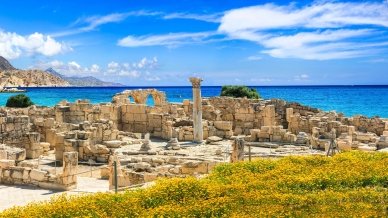
Kourion, Cyprus
At present, only the ruins on the very top of the cliff make people recollect the ancient metropolitan city. Among the buildings that survived intact, there are the ruins of several houses and the amphitheatre. As a result of excavations, the remains of the agora and early Christian basilicas came to light.
The amphitheatre has undergone a complete reconstruction, so nowadays, it has become a venue to hold concerts with a capacity of up to 3,000 people.
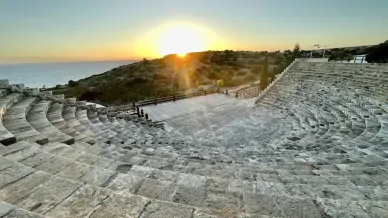
The amphitheater in Kourion
Curium is a place where not only the history fans struggle to show up. Those who cannot imagine their lives without the thrills may try hang-gliding or delight in the breathtaking sea views from the clifftop.
In summer, the heat in Cyprus becomes so starching that travellers are recommended to comply with the precautionary measures. So if you embark on a tour to Kourion, protect your head with a hat or a kerchief from the hot sun, or choose an evening or morning time when the temperature is lower.
Ayia Napa
Though Cyprus is considered one of the world's best beach resorts, there are only a few really good places for recreation by the sea.
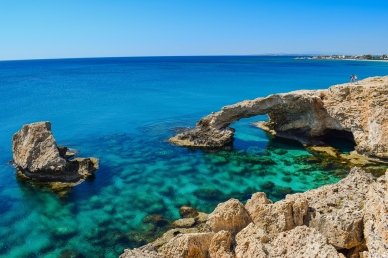
Ayia Napa, Cyprus
Ayia Napa is the leading youth resort with day-and-night parties that last till the end of October. It is also the favoured site of the fans of noisy get-togethers, located an 8-km drive from a small village in southeastern Cyprus called Protaras.
Music never stops playing on Nissi Beach during the high season. There are performances of the invited DJs, beer parties, groovy gatherings, and other bright events traditionally held by the legendary beach bar.
The beach itself is famous for clear white sand and incredibly beautiful waters that constantly change their colours from soft blue to dark turquoise. It is clear and safe here, so Nissi Beach has obtained the Blue Flag international award.
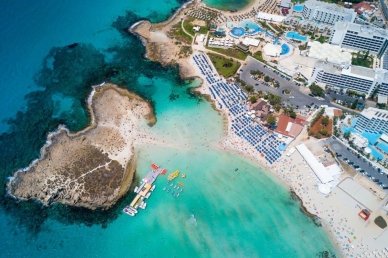
Nissi Beach, Ayia Napa
Those who do not take satisfaction in an idle lying on the beach chairs are offered a variety of traditional beach entertainment types like volleyball, windsurfing, and waterskiing.
However, Ayia Napa is not only about discos and parties. Tourists also love to visit the museum monastery, built in the 15th century by Venetians.
The functioning temple, where people can pray and confess their sins, is located nearby, a 50-m distance from the monastery. The services are held by the priests of the Cypriot Orthodox Church.
Food
The cult of food is the main thing that precisely describes the gastronomic habits of Cypriots. They eat much and almost ceaselessly, if not to take into account the break for sleep. And it is not surprising because much effort is necessary to break away from the delicious and flavourous dishes of Cypriot food.
It resembles Greek cuisine a lot, and even most of the names are the same. The basis of dishes involves meat, seafood, fish, an abundance of vegetables, and fruit cooked with olive oil by frying, stewing, or adding to salads. Various sauces are a widespread thing among Cypriots. The most known in the world is tzatziki — a white sauce based on thick and sugarless yoghurt with garlic, dill, mint, parsley, and thyme.
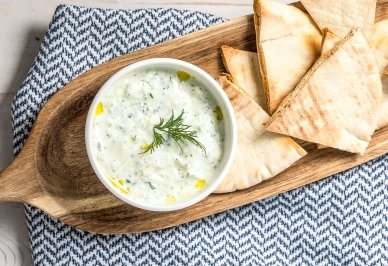
Tzatziki sauce
In Cyprus, meat is a constituent of every course. There are hundreds of recipes for cooking pork, chicken, lamb, and turkey.
Souvla is grilled meat, usually served with substantial portions of Greek salad, consisting of pieces of tomatoes, cucumbers, sweet pepper, feta cheese, and red onions, flavoured with olive oil.

Cypriot souvla
The main trick of cooking any meat-based dish is marinating in wine with spices and herbs. That is the way how afelia (pork marinated in red wine with cilantro) and stifado (beef stew with shallots) are cooked.
Minced meat dishes have a delicious taste. For instance, sheftalia constitutes minced meat wrapped in pork omentum and fried as sausages. If this kind of meat is roasted with eggplants and potatoes, the dish is called moussaka, quite popular in Cyprus, Turkey, and the Balkan countries.
Makaronia Tou Fournou is a Cypriot pasta bake with Bechamel sauce.
The number one meat dish called kleftiko should not be left unmentioned as it is the visiting card of Cypriot cuisine. This beautiful word with a stress on the first syllable means stolen. According to the ancient legend, a specific way of cooking lamb was invented by shepherds who once stole a goat from a stingy man. To disguise the theft, they buried the carcass in the ground and lit the fire above it.

Cypriot meat dish kleftiko.
While the furious man was looking for the lost animal, he could not notice the meat being cooked almost in front of him. Eventually, he decided that the wolves had eaten his goat. The cunning shepherds got away with the theft, and when they dug up the hollow, there was a flavoursome and perfectly roasted meat on the bottom.
Since then, that has been the exact way of cooking lamb in Cyprus. Of course, nobody steals the animals, but the pieces of meat get roasted in a specific dome-shaped stove with little space inside. They put some amount of meat inside, covering up the doors with dough to keep the steam. The cooking process takes several hours, but in the end, there is a tender dish with an incredibly appetizing aroma. So if you have been to Cyprus but have not tried kleftiko, that means you have committed an unforgivable crime!
Any dinner is incomplete without meze — assorted appetizers served on small plates, abundant with cheeses, sauces, nuts, olives, fish, meat, and seafood. Such an approach is traditional not only for Cyprus: meze is an indispensable element of the spread of Greeks and Turks. Many centuries ago, this tradition took its roots in Greece and Turkey and appeared on the island to remain there forever.
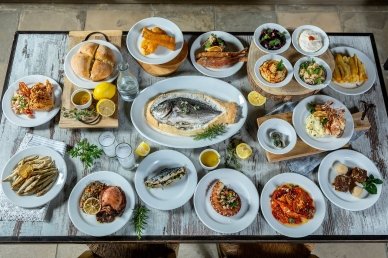
Fish Meze
If there is some space left in your stomach for more food, you have to try Cypriot desserts then. Baklava, churchkhela, and loukoumi will make you delight in a delicious taste.
Cypriot women like to treat their families and guests with loukoumades — fried cinnamon donuts sprinkled with honey, or kataifi — a dessert that resembles thin wires.

Cypriot loukoumades
What about the drinks? Cyprus has a heavenly climate for growing grapes and making wine. Cypriot wines are well-known across Europe, so leaving the island, tourists will always take a bottle of commandaria. The history of this beverage began several millennia ago at the time when Pliny the Elder invented the technology of its manufacturing.
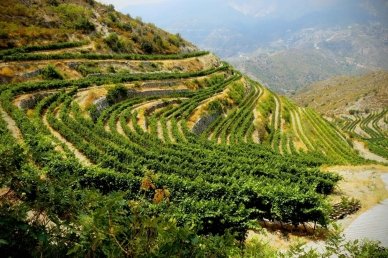
Wine fields in the Troodos Mountains in Cyprus
This amber-coloured wine of 15-22% ABV entangles a pleasant caramel taste. It is usually served with desserts in a cooled state. What is more, this drink is not cheap: the average price ranges from €20 to €25. And the best quality commandaria is the one produced at Kykkos Monastery.
The fans of hard spirits often prefer ouzo (the anise vodka served cooled as an aperitif) and Five Kings cognac (the beverage of 15-year aging made in Cyprus since the 14th century).
The national drink called zivania has 45-53% ABV and is made of grape pomace. It is most common in Cypriot villages, where there is a peculiar distilling machine called lambikos. No rural or family celebration can do without zivania, so the quantity of its production is impressive. Since tourists like to purchase a couple of bottles as a souvenir, that already makes 25% of the total sales volumes of zivania in the country.
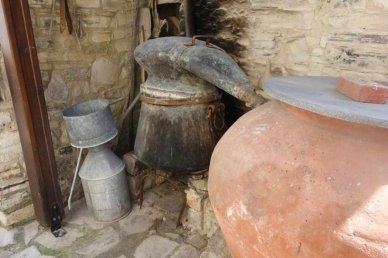
Vintage zivania distillation equipment
Cyprus is a fabulous place where the vacation is exceptionally great, the sun shines brighter, and cheerful Cypriots create a positive and peaceful atmosphere. Siga siga! Life is too good to live it hastily...
FAQ
Is Cyprus Turkish or Greek?
Cyprus is an independent country with a Greek Cypriot majority in the Republic of Cyprus and a Turkish Cypriot community in the northern part of the island, recognized only by Turkey as the Turkish Republic of Northern Cyprus.
What is the capital of Cyprus?
The capital of Cyprus is Nicosia.
How big is the whole of Cyprus?
The total area of Cyprus is about 9,251 square kilometers.
What is the population of Cyprus?
The population of Cyprus is approximately 1.2 million people.
What language is spoken in Cyprus?
Greek and Turkish are the official languages of Cyprus. English is also widely spoken.
Which religion is the most in Cyprus?
The predominant religion in Cyprus is Greek Orthodox Christianity.
Does Cyprus belong to Europe or Asia?
Geographically, Cyprus is located in Western Asia, but it is culturally and politically aligned with Europe.
Is Cyprus Greek or independent?
Cyprus is an independent sovereign nation, not part of Greece, although the Greek Cypriot community forms the majority.
Is Cyprus in the EU?
Yes, Cyprus is a member of the European Union.
Does Cyprus use the euro?
Yes, Cyprus uses the Euro (EUR) as its currency.
What type of government is used in Cyprus?
Cyprus is a presidential republic where the President is both the head of state and government.
Does Cyprus have a good economy?
Cyprus has a high-income economy, but it has faced economic challenges, including a significant banking crisis in the early 2010s. The economy is diversified, including tourism, shipping, and financial services.
What is Cyprus mostly known for?
Cyprus is known for its beautiful beaches, historical sites, and as the legendary birthplace of the goddess Aphrodite.
Is Schengen visa valid in Cyprus?
Cyprus is not part of the Schengen Area, but it generally accepts Schengen visas for short-term tourist visits.
Do you need a visa to go to Cyprus?
Visa requirements for Cyprus depend on your nationality. EU citizens do not need a visa, and many other nationalities can enter for short stays without a visa.
Which city is safest in Cyprus?
Cyprus is generally a safe country. Cities like Paphos, Limassol, and Nicosia are considered safe, with Paphos often being highlighted for its particularly low crime rate.
What is crime like in Cyprus?
Cyprus is known for having a low crime rate compared to other European countries. Petty crimes like theft do occur, but violent crime is rare.







